Az – The Suspected Adulteress 5: 11-31
The Suspected Adulteress
5: 11-31
The suspected adulteress DIG: Why was this strange mitzvah required for a woman suspected of adultery? Why was the woman’s head uncovered? Why was the “holy water” holy? Why was it mixed with dust from the Tabernacle floor? Why was the oath written on a scroll then erased in the bitter water? Why was it so important? What was the lesson?
REFLECT: Is it possible for a marriage to recover after adultery? How so? What effect do you think this ritual would have had on the rest of the community? What effect do you think it may have had on the woman in question, or her marriage if she was found innocent? Why do you think this ritual did not apply if a man was unfaithful to his wife? Or did it?
The priest would take the case out of the hands of a human court,
and placed it in the hands of God.

The ritual of bitter water flows naturally after the mitzvah of sending the unclean out of the camp (to see link click Ax – The Purification of the Camp), and the mitzvah of confessing one’s sin (see Ay – Restitution and Repentance). The scene pictured here was an irate husband who suspected that his wife had been unfaithful. Having no proof, his only recourse was to bring her to the Tabernacle where she underwent the ordeal of bitter water. The priest would make her drink a potion consisting of holy water to which dust from the floor of the Tabernacle and a scroll containing a curse had been added. The curse spelled out the consequences. If she was guilty, her womb shriveled up and wasted away, and she would no longer be able to conceive. If, however, the bitter water had no effect on her, she was declared righteous, her womb would be fruitful and she was blessed to conceive and bear children.89 This section is clearly connected with the previous one by the repetition of the word translated unfaithful. In previous teaching, we looked at a case where a person, who defrauded or robbed someone else, committed an unfaithful act against God (5:6). Here we see a case where a wife was thought to be unfaithful to her husband. The same Hebrew word, ma’al, is used in both cases.
A The case (5:11-14): ADONAI said to Moshe, “Tell the people of Isra’el, ‘If a man’s wife goes astray and is unfaithful to him; that is, if another man goes to bed with her without her husband’s knowledge, so that she becomes unclean (see the commentary on Leviticus Bk – Ritually Clean and Unclean Animals) secretly, and there is no witness against her, and she was not caught in the act; then, if a spirit of zealousness comes over him, and he was zealous for his wife, and she has become unclean – or, for that matter, if the spirit of zealousness comes over him, and he is zealousness of his wife, and she has not become unclean.
The Hebrew root qinah combines the two concepts of jealousy and zeal. So, zeal, or zealousness, meaning a passionate devotion to, would be a better term to use than jealous, which has negative, even petty connotations. Therefore, a husband’s zealousness would burn for his wife, just as ADONAI is zealous for His wife. YHVH is making an important point here. By making provision for the proper expression of a husband’s zealousness, Ha’Shem is teaching us that zealousness for the right reason is not wrong. Because God and Isra’el are viewed as married, Isra’el is viewed as the wife of ADONAI (Deuteronomy 5:1-3, 6:10-15, 7:6-11; Isaiah 54:1-8, 62:4-5; Jeremiah 31:31-34; Ezeki’el 16:8; Hosea 2:14-23). For that very reason, ADONAI declares that He is a zealous God (Exodus 20:5)! God has a right to be zealous over what is rightfully His, and the husband, in this analogy, also had every right to be zealous over what was rightfully his.
Dear Heavenly Father, Praise You, that You are a just and fair God. You give respect to both men and women and You offer a fair way to protect both of them. It is so wise to put the final verdict into Your hands. Thank You, for protecting women in many ways! Under the Torah, You lovingly made provision for women who were trapped in marriages with hard- hearted husbands. You gave protection for women who had been sold into slavery as slave brides but then were not wanted. You gave three mitzvot for providing for a slave wife. Since legal protection is provided for a slave wife, how much more would it apply to a free wife in Isra’el? Whoever purchased and married a slave woman had to provide her with “food” (the Hebrew word signifies high-quality food), “clothing”, and “marriage rights” (probably a reference to regular marital relations so that she could have children). If the husband violated his responsibility to make such provisions, he was to let his wife “go out free”. Which can mean no less than formal divorce (Exodus 21:7-11). The point being, that if this woman, sold as a slave-wife, is no longer to be a wife, she cannot be kept as a slave on the pretext that she is the man’s wife. Instead, she is to be given her freedom.
There are more ways you protect women. You protected prisoners of war whom men no longer desired to be their wives. According to Moses, even a woman who was taken as a wife from the spoils of war was to be given legal protection. If her husband became dissatisfied with her, he had to treat her as he would a wife from his own people. He was not allowed to subject her to brutal treatment. Instead, the mitzvah required him to give her a certificate of divorce (Deuteronomy 24:1).
You also so graciously protected women who were no longer loved. It is noteworthy that the mitzvah in Deuteronomy 24:1-4 apparently did not require the husband to prove that he had valid grounds for the divorce. Neither did it subject either the man or the woman to community discipline. The only restriction was that the man who divorced his wife forfeited his right to remarry if she married someone else in the interim. We can probably safely conclude, however, that the husband is not making a public accusation of adultery. The mitzvah of Moses required death for adulterers, not a provision of divorce (Deuteronomy 22:22).
Thank You, Ruach, for guiding Paul to address new protection for women when he answered new questions from the Corinthian believers (First Corinthians 7:10-16). Father, You designed marriage to be a loving covenant that lasts forever, but if hard, heartedness, causes the marriage not to last, You, God, are righteous and fair and make provision for the one who is abused. Praise You always for your purity and holiness that are wrapped in Your love and wisdom. In Yeshua’s holy name and power of His resurrection. Amen
The first interesting point about this passage is that it teaches compassionate sensitivity toward both the husband’s and the wife’s needs. The need of the husband in this case was to claim his zealousness regarding the possibility of his wife’s unfaithfulness with another man. Should the husband passively ignore the sin? The Torah answers with a resounding, “NO!” It fights off a potentially dangerous situation caused by the unchecked zealousness of the husband, by outlining a judicial process to see if his fears were justified or not.
The Sages make it clear that the suspicion must be warranted. Though no witness to an illicit act was required (5:13), there must have been at least a witness to ascertain that the woman had the opportunity to commit adultery by being secluded with another man. A simple suspicion of adultery was not sufficient cause for the ritual. Furthermore, per the interpretation of the Sages, the words: he was zealous for his wife (5:14) are understood to mean that he had expressed his zealousness to her and explicitly warned her about being seduced with a certain man (Chofez Chaim 1:2). If after being warned, she had secluded herself with him, then there was certainly cause for suspicion. Accordingly the Oral Law (see the commentary on The Life of Christ Ei – The Oral Law), the Sages of the Second Temple ear would only allow a trial if these criteria had been met.90
B Preparation of the ritual (5:15-18): The husband was to bring his wife to the priest, along with a grain offering for her. It was unlike other grain offerings (see Leviticus Aj – The Grain Offerings: Dedicated to God) because it was a grain offering for zealousness, a grain offering for remembering, for recalling guilt to mind (5:15). The function of every offering was to bring a person near (korban) to ADONAI. This was usually a positive experience. The person bringing the sacrifice, even when it was a purification offering (see Leviticus Al – The Purification Offering: Purified by Blood) or guilt offering (see Leviticus Am – The Guilt Offering: Evidence of Repentance), did so to purposely draw near to God. In this case, the grain offering for zealousness was brought to bring his wife near to God. He brought it on her behalf for either vindication or condemnation. The offering was a reminder of the iniquity with which she had been charged. Because of the nature of the sacrifice, it was made of two courts of barley flour (the cheapest of flours), on which he has not poured olive oil or put frankincense.
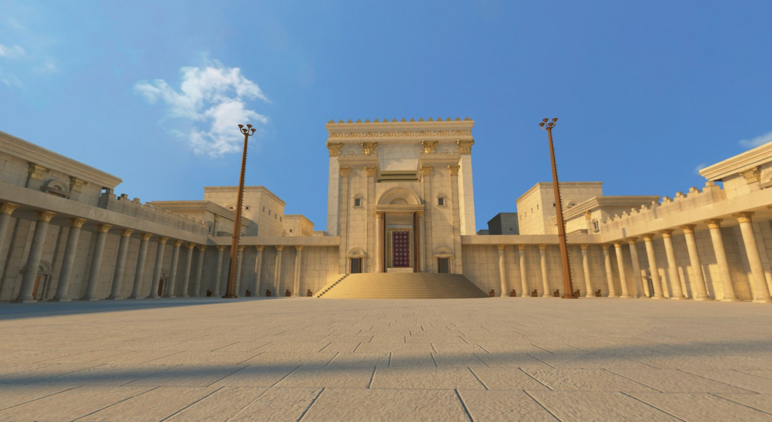
The priest will bring her forward and place her before ADONAI, that is, at the gate of the Tabernacle (see the commentary on Exodus Ez – The Gate of the Tabernacle: Christ, The Way to God). In the Second Temple era, she would have been brought to the Nicanor Gate in the Court of the Women as seen here. He will put holy water probably taken from the bronze basin (see Exodus Fh – The Bronze Basin: Christ, our Cleanser) in a clay pot and then he will take some of the dust on the floor of the Tabernacle and put it in the water (5:16-17). The holy water was not holy because it was blessed; it was holy because it was Tabernacle water. Though the woman, in her state of suspected uncleanness, was not allowed to tread the sacred ground of the Tabernacle, the sacredness of the Tabernacle was brought to her, so to speak.
Then, the priest will place the woman before ADONAI, unbind the woman’s hair. This was probably understood as a symbolic act representing the vulnerability of her married status. As she stood before God, she no longer stood under her husband’s authority, but before God alone. After that, the priest put the grain offering for zealousness in her hands while he had in his hand the cup of bitter water and cursing (5:18). This was equivalent to the laying on of hands that was performed with an animal offering. The grain offering is invested with her identity. It will be waved before ADONAI with its memorial portion going onto the bronze altar (5:25). Through the grain offering, she will be vicariously brought into the presence of the LORD where He will decide regarding her innocence or guilt. Only after the offering up of the grain offering for zealousness was she to drink the bitter water.91
Many have noticed similarities between the ritual of the wife drinking the bitter water and the story of Isra’el’s golden calf apostasy (see Exodus Gu – They Gave Me This Gold, I Threw It into a Fire and Out Came this Calf). There, Moshe mixed water with the dust of the golden calf, which had been ground into powder. The dust presumably functioned as a trial by ordeal and brought punishment upon the Israelites who were guilty of worshiping the idolatrous golden calf, just as the waters of bitterness brought judgment upon the unfaithful wife here in Numbers 5. Jeremiah also used the imagery of Isra’el bringing judgment on itself by drinking the poisonous water of its idolatry (Jeremiah 9:15 and 23:15).
As far as the wife was concerned, if she was innocent, she needed to have her name cleared of any suspicion. This ritual was provided for such justice. It actually protected her from the lynch-mob mentality of an angry community or zealous husband. The priest would take case out of the hands of a human court and placed it under divine judgment.92
Why is there no trial of bitter water for men when a wife suspected her husband of adultery? In the Dispensation of Torah (see the commentary on Exodus Da – The Dispensation of the Torah), a man had the right to issue a certificate of divorce, but the wife did not. Even if she suspected him of adultery, she could not divorce him, whereas he could divorce her on those same grounds. Therefore, the trial of bitter water was meant to prevent divorce. Most likely this ritual doesn’t sit well with us, but we must remember that YHVH treated people differently in different Dispensations. It was all part of His progressive revelation. Lastly, we must remember this mitzvah was an attempt to save a marriage by exonerating the wife who was falsely accused.93
C The oath-spoken curse (5:19-24): The wife was required to take an oath in the name of ADONAI. The Oral Law allowed her to back out and refuse to take the oath. If she did, she was to be given a certificate of divorce without payment of any of her wedding contract’s alimony terms. Even with her confession, she could not be stoned for adultery because, as had already been determined, there were no witnesses to testify against her in a court of law (Numbers 5:13; Deut 19:15).
The priest will make her swear by saying to her, “If no man has gone to bed with you, if you have not gone astray to make yourself unclean while under your husband’s authority, then be free from this bitter water and cursing. But if you have in fact gone astray while under your husband’s authority and become unclean, because some man other than your husband has gone to bed with you” then the priest is to make the woman swear with an oath that includes a curse; the priest will say to the woman, “may ADONAI make you an object of cursing and condemnation among your people by making your womb shrivel up and waste away and your abdomen swell! May this water that causes the curse go into your inner parts and make your abdomen swell and your genital area will distend (and she would no longer be able to conceive, a disgrace in the Jewish community)!” – and the woman is to respond, “Amen! Amen!” This confirmed the acceptance of the curse (Deut 27:15-26; Numbers 5:13). Then the priest is to write these curses on a scroll, wash them off into the water of embitterment and make the woman drink the water of embitterment and cursing – the water of cursing will enter her and become bitter. This mitzvah is the only explicit instance in Scripture of trial by ordeal. After the Temple was destroyed, the ritual was abolished.94
According to the rabbis, the priest would encourage her to confess by adding these words, “Wine can be responsible for much, or foolishness can be responsible for much, or childishness can be responsible for much. Many have been guilty before you and were swept away (when they refused to confess and then drank the bitter water). Do not cause the great Name to be blotted out in the water of bitterness.” Then he told her of the affair of Reuben with Bilhah (Gen 35:22), and of Judah with Tamar (Gen 38:15ff). They confessed and inherited life in the next world.95
B Execution of the ritual (5:25-28): Then the priest is to remove the grain offering for zealousness from the woman’s hand, wave the grain offering before ADONAI and bring it to the bronze altar. The priest is to take a handful of the grain offering as its memorial portion and make it go up in smoke on the altar; afterwards, he is to make the woman drink the water. When he has made her drink the water, then, if she is unclean and has been unfaithful to her husband, the bitter water would have an immediate effect on her. The water that causes the curse will enter her and become bitter, so that her abdomen swells and her womb shrivels up and wastes away; thus, she would be barren and become an object of cursing among her people. Though the Torah only specifies that her womb shriveled up and wasted away, the Sages assure us that the effect was fatal. She had barely begun to drink before her face turned yellow, her eyes bulged and her veins swell. They say, “Take her away!” Take her away!” so that the Temple court will not be made unclean [by her corpse] (m.Sotah 3.4). According to the traditional understanding, the man who committed adultery with her also died the same death. Since their sin was in secret, it could not be prosecuted by a court of law. Thus, their verdict was handed to them by Heaven, but only after the woman was given ample opportunity to confess and repent.96
But if the woman is not unclean but clean and innocent, then the water had a different effect on her. Rather than having her womb shrivel up and waste away, her womb would be fruitful and she was blessed to conceive and bear children.
Now let’s consider some of the issues involved in this ritual. There’s no record in Scripture that any husband ever used it, or that any accused wife asked for it. Perhaps the very existence of this ritual provided a barrier to adultery and a warning that sin would be found out. There were clearly some built-in roadblocks that would make a husband hesitate to rush to the priest and ask for his wife to undergo this ritual. To begin with, it was a public event, performed at the gate of the Tabernacle, and the whole camp would know about it. Would a husband want to expose his marital problems openly, especially when he couldn’t know the results of the ritual? Furthermore, what transpired there told something about the husband as well as the wife. If the husband loved his wife and was deeply hurt by her possible infidelity, why would he want to expose her publicly? But if he didn’t love her and only wanted to hurt her, he might be embarrassed and proved wrong. A wise man would think twice (maybe three or four times) before having his wife judged in this way.97
A The mitzvah (5:29-20): This is the mitzvah of zealousness: when either a wife under her husband’s authority goes astray and becomes unclean, or the spirit of zealousness comes over a husband and he becomes zealous for his wife, then he is to place the woman before ADONAI, and the priest is to deal with her in accordance with all of this mitzvah.
Postscript (5:31): The husband will be clear of guilt, but, if guilty, the wife will bear the consequences of her guilt. However, if she is innocent, her name and standing will be cleared before the whole community. The purity and sanctity of the community was thereby assured, so that the nation would be prepared to move out from Sinai to the Promised Land and experience the fullest blessing of ADONAI.
The Torah and the Bitter Water: In a spiritual sense, we are all like the woman who stood accused. The holy water we drink is the water of the Torah. It is water from the Tabernacle in heaven, mixed with the words of the Scroll. Those words will either exonerate us or condemn us, depending on our innocence or guilt. Unfortunately, we are all guilty. All of us have become like one who is unclean, and all our righteous acts are like filthy rags; we all shrivel up like a leaf, and like the wind our sins sweep us away (Isaiah 64:6). The words of Torah can only condemn us. This was the ministry of the Dispensation of Torah. To the guilty, the words or the Scroll are poison, resulting in death. In Messiah, however, our old nature has already died. We know that the curse of the Torah has already been met. Having confessed our sins and have become a new creation in Messiah, we are able to strand the trial of bitter water with confidence. For us then, the bitter water is not bitter water, but holy water. It is not a ministry of death; but a ministry of life. Rather than working death within us, a life has been conceived within us . . . Messiah’s life.98






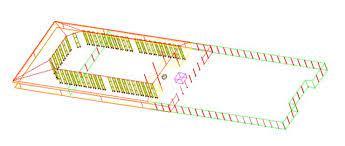
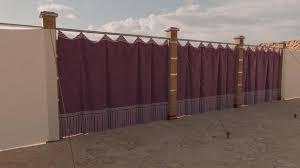
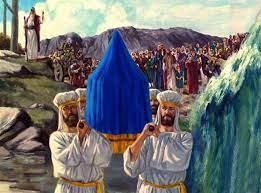

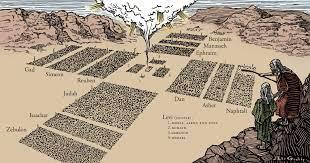
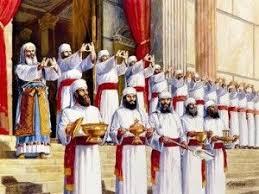

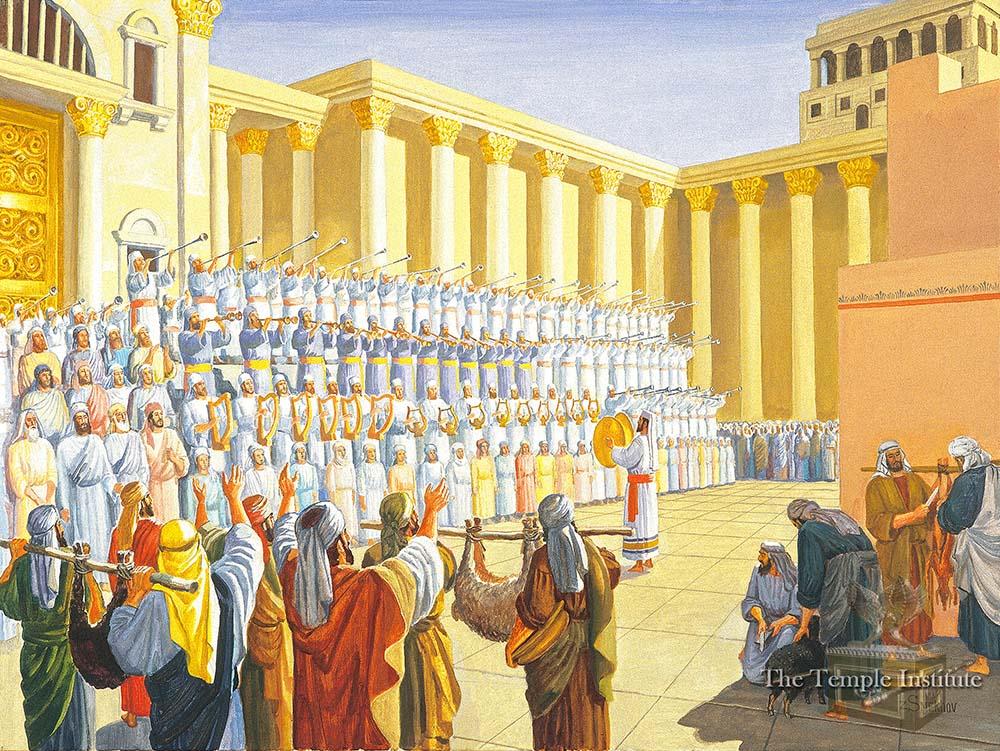

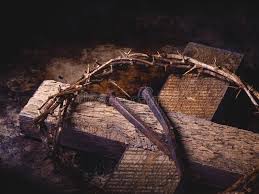
 ழங்கால
ழங்கால  तब बारहों में से एक, अन्द्रियास, जो शमौन पतरस का भाई था, बोलकर बोला, यहां एक लड़का है जिसके पास पांच छोटी जौ की रोटियां और दो छोटी मछलियां हैं, परन्तु वे इतने लोगों के बीच कहां तक जाएंगे (मती १४:१७; मरकुस ६:३८) ; लूका ९:१३बी; युहन्ना ६:८-९)? बेशक, अन्द्रियास को भी पता था कि पांच जौ की रोटियां और दो छोटी मछलियां पांच हजार लोगों को खिलाने के लिए पर्याप्त नहीं होंगी, लेकिन (अपने विशिष्ट अंदाज में) वह लड़के को वैसे भी यीशु के पास ले आया। येशुआ ने इसकी आज्ञा दी और अन्द्रियास ने अपना सर्वश्रेष्ठ प्रयास किया। उसे भोजन का एकमात्र स्रोत उपलब्ध मिला, और उसने सुनिश्चित किया कि मसीहा को इसके बारे में पता हो। उसे कुछ-कुछ समझ में आ गया था कि चमत्कार करने वाले रब्बी के हाथों में कोई भी उपहार महत्वहीन नहीं है।
तब बारहों में से एक, अन्द्रियास, जो शमौन पतरस का भाई था, बोलकर बोला, यहां एक लड़का है जिसके पास पांच छोटी जौ की रोटियां और दो छोटी मछलियां हैं, परन्तु वे इतने लोगों के बीच कहां तक जाएंगे (मती १४:१७; मरकुस ६:३८) ; लूका ९:१३बी; युहन्ना ६:८-९)? बेशक, अन्द्रियास को भी पता था कि पांच जौ की रोटियां और दो छोटी मछलियां पांच हजार लोगों को खिलाने के लिए पर्याप्त नहीं होंगी, लेकिन (अपने विशिष्ट अंदाज में) वह लड़के को वैसे भी यीशु के पास ले आया। येशुआ ने इसकी आज्ञा दी और अन्द्रियास ने अपना सर्वश्रेष्ठ प्रयास किया। उसे भोजन का एकमात्र स्रोत उपलब्ध मिला, और उसने सुनिश्चित किया कि मसीहा को इसके बारे में पता हो। उसे कुछ-कुछ समझ में आ गया था कि चमत्कार करने वाले रब्बी के हाथों में कोई भी उपहार महत्वहीन नहीं है।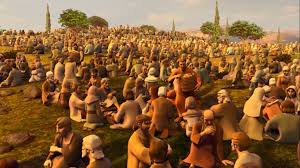 खानेवालों की गिनती लगभग पाँच हज़ार थी। यहां पुरुषों के लिए शब्द एंथ्रोपोस नहीं है, सामान्य शब्द जिसमें पुरुष और महिलाएं शामिल हो सकते हैं, बल्कि अन्य, एक व्यक्तिगत पुरुष के लिए शब्द है। पाँच हजार निस्संदेह एक पूर्ण आंकड़ा है, इसमें उपस्थित महिलाओं और बच्चों की गिनती नहीं की जा रही है। यदि उनकी गिनती की जाती तो कुल मिलाकर लगभग बीस हजार लोग होते (मती १४:२१; मरकुस ६:४४; लूका ९:१४ए; युहन्ना ६:१०बी)। यह युहन्ना की पुस्तक में यीशु के सात चमत्कारों में से चौथा है (यूहन्ना २:१-११; ४:४३-५४; ५:१-१५; ६:१६-२१; ९:१-३४; ११:१-४४ )।
खानेवालों की गिनती लगभग पाँच हज़ार थी। यहां पुरुषों के लिए शब्द एंथ्रोपोस नहीं है, सामान्य शब्द जिसमें पुरुष और महिलाएं शामिल हो सकते हैं, बल्कि अन्य, एक व्यक्तिगत पुरुष के लिए शब्द है। पाँच हजार निस्संदेह एक पूर्ण आंकड़ा है, इसमें उपस्थित महिलाओं और बच्चों की गिनती नहीं की जा रही है। यदि उनकी गिनती की जाती तो कुल मिलाकर लगभग बीस हजार लोग होते (मती १४:२१; मरकुस ६:४४; लूका ९:१४ए; युहन्ना ६:१०बी)। यह युहन्ना की पुस्तक में यीशु के सात चमत्कारों में से चौथा है (यूहन्ना २:१-११; ४:४३-५४; ५:१-१५; ६:१६-२१; ९:१-३४; ११:१-४४ )।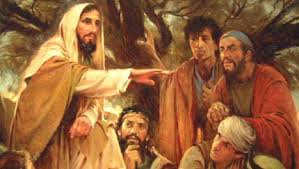 उसने अपने बारह प्रेरितों को अपने पास बुलाया और उन्हें परमेश्वर के राज्य का प्रचार करने के लिए अपने राजदूतों के रूप में दो-दो करके भेजा। उसने उन्हें बुरी आत्माओं को निकालने और इस्राएल के विश्वासी बचे हुए लोगों के बीच हर बीमारी और बीमारी को ठीक करने का अधिकार दिया (मत्ती १०:१; मरकुस ६:७; लूका ९:१-२)। तथ्य यह है कि येशुआ ने बारह लोगों को चुना यह कोई संयोग नहीं है, क्योंकि यह इज़राइल के बड़े समुदाय और बारह जनजातियों के समानांतर है। इस विशेष आयोग में हमें तीन बातों पर ध्यान देने की आवश्यकता है। सबसे पहले, उसने उन्हें दो-दो करके भेजा (मरकुस ६:७)। दूसरे, यीशु ने उन्हें परमेश्वर के राज्य का प्रचार करने के लिए भेजा, सुसमाचार का नहीं (लूका ९:२)। प्रभु के पुनरुत्थान के बाद तक शुभ समाचार घोषित नहीं किया जा सका क्योंकि अनुग्रह की व्यवस्था उनके लिए एक रहस्य थी (इफि ३:३-९ और कुलु २:२)। तीसरा, उसने उन्हें प्रत्यायोजित अधिकार दिया (मत्ती १०:१)। यह महत्वपूर्ण होगा कि शिष्यों के संदेश की वैधता की पुष्टि करने के लिए ईश्वर की शक्ति प्रकट हो।
उसने अपने बारह प्रेरितों को अपने पास बुलाया और उन्हें परमेश्वर के राज्य का प्रचार करने के लिए अपने राजदूतों के रूप में दो-दो करके भेजा। उसने उन्हें बुरी आत्माओं को निकालने और इस्राएल के विश्वासी बचे हुए लोगों के बीच हर बीमारी और बीमारी को ठीक करने का अधिकार दिया (मत्ती १०:१; मरकुस ६:७; लूका ९:१-२)। तथ्य यह है कि येशुआ ने बारह लोगों को चुना यह कोई संयोग नहीं है, क्योंकि यह इज़राइल के बड़े समुदाय और बारह जनजातियों के समानांतर है। इस विशेष आयोग में हमें तीन बातों पर ध्यान देने की आवश्यकता है। सबसे पहले, उसने उन्हें दो-दो करके भेजा (मरकुस ६:७)। दूसरे, यीशु ने उन्हें परमेश्वर के राज्य का प्रचार करने के लिए भेजा, सुसमाचार का नहीं (लूका ९:२)। प्रभु के पुनरुत्थान के बाद तक शुभ समाचार घोषित नहीं किया जा सका क्योंकि अनुग्रह की व्यवस्था उनके लिए एक रहस्य थी (इफि ३:३-९ और कुलु २:२)। तीसरा, उसने उन्हें प्रत्यायोजित अधिकार दिया (मत्ती १०:१)। यह महत्वपूर्ण होगा कि शिष्यों के संदेश की वैधता की पुष्टि करने के लिए ईश्वर की शक्ति प्रकट हो।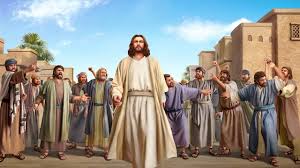 क्या उसकी सभी बहनें यहाँ हमारे साथ नहीं हैं (मत्तीयाहु १३:५६ए; मरकुस ६:३बी)? इस पाठ और कई अन्य (मत्ती १२:४६-४७; लूका २:७; युहन्ना ७:१०; प्रेरितों १:१४) से, यह स्पष्ट है कि मरीयम शाश्वत कौमार्य में नहीं रहती थी, जैसा कि रोमन कैथोलिक विधर्म का दावा है। जब परमेश्वर पवित्र आत्मा ने उसे गर्भवती किया तब वह कुंवारी थी। लेकिन बाद में, मरीयम ने अपने पति जोसेफ के साथ सामान्य यौन संबंध बनाए और उनका एक परिवार बन गया। चाहे प्रेरित सुसमाचार लेखकों ने भाई के लिए पुल्लिंग एडेलफ़ॉस का उपयोग किया हो, या बहन के लिए स्त्रीलिंग एडेल्फ़ का, उन दोनों का मूल एक ही है, और उनका अर्थ एक ही गर्भ से है।
क्या उसकी सभी बहनें यहाँ हमारे साथ नहीं हैं (मत्तीयाहु १३:५६ए; मरकुस ६:३बी)? इस पाठ और कई अन्य (मत्ती १२:४६-४७; लूका २:७; युहन्ना ७:१०; प्रेरितों १:१४) से, यह स्पष्ट है कि मरीयम शाश्वत कौमार्य में नहीं रहती थी, जैसा कि रोमन कैथोलिक विधर्म का दावा है। जब परमेश्वर पवित्र आत्मा ने उसे गर्भवती किया तब वह कुंवारी थी। लेकिन बाद में, मरीयम ने अपने पति जोसेफ के साथ सामान्य यौन संबंध बनाए और उनका एक परिवार बन गया। चाहे प्रेरित सुसमाचार लेखकों ने भाई के लिए पुल्लिंग एडेलफ़ॉस का उपयोग किया हो, या बहन के लिए स्त्रीलिंग एडेल्फ़ का, उन दोनों का मूल एक ही है, और उनका अर्थ एक ही गर्भ से है। आस्था एक
आस्था एक 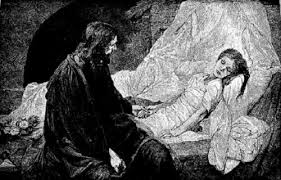 अविश्वसनीय भीड़ को बाहर खदेड़ने के बाद, वह बच्चे के पिता, माँ और अपने साथ आए शिष्यों को ले गया, और जहाँ बच्चा था, वहाँ गया। प्रेरितों के लिए, उद्देश्य मसीहा में
अविश्वसनीय भीड़ को बाहर खदेड़ने के बाद, वह बच्चे के पिता, माँ और अपने साथ आए शिष्यों को ले गया, और जहाँ बच्चा था, वहाँ गया। प्रेरितों के लिए, उद्देश्य मसीहा में  महल के अंदर, उस समय प्रथा यह थी कि पुरुष और महिलाएं अलग-अलग भोज हॉल में भोजन करते थे। उस कक्ष में जहां एंटिपास ने पुरुषों के साथ खाना खाया, उसने मनोरंजन के लिए बुलाया और फिर उसकी सौतेली बेटी सैलोम, जो हेरोदियास की बेटी थी, को बड़े हॉल में आते हुए और उनके लिए नृत्य करते हुए ध्यान से देखा। इस तरह का नृत्य उच्च श्रेणी या यहाँ तक कि सम्मानजनक महिलाओं के लिए लगभग एक अभूतपूर्व बात थी। लेकिन भूरे रंग के बालों वाली खूबसूरत युवा किशोरी डफ और प्रतीकों की थाप पर आकर्षक ढंग से झूलते हुए कमरे के चारों ओर धीरे-धीरे घूम रही थी। सभी पुरुष मंत्रमुग्ध थे और उस पर से अपनी नजरें हटाने में असमर्थ थे। जब संगीत ख़त्म हुआ तो अनुमोदन की गर्जना इतनी तेज़ थी कि इसे महिलाओं के बैंक्वेट हॉल तक सुना जा सकता था।
महल के अंदर, उस समय प्रथा यह थी कि पुरुष और महिलाएं अलग-अलग भोज हॉल में भोजन करते थे। उस कक्ष में जहां एंटिपास ने पुरुषों के साथ खाना खाया, उसने मनोरंजन के लिए बुलाया और फिर उसकी सौतेली बेटी सैलोम, जो हेरोदियास की बेटी थी, को बड़े हॉल में आते हुए और उनके लिए नृत्य करते हुए ध्यान से देखा। इस तरह का नृत्य उच्च श्रेणी या यहाँ तक कि सम्मानजनक महिलाओं के लिए लगभग एक अभूतपूर्व बात थी। लेकिन भूरे रंग के बालों वाली खूबसूरत युवा किशोरी डफ और प्रतीकों की थाप पर आकर्षक ढंग से झूलते हुए कमरे के चारों ओर धीरे-धीरे घूम रही थी। सभी पुरुष मंत्रमुग्ध थे और उस पर से अपनी नजरें हटाने में असमर्थ थे। जब संगीत ख़त्म हुआ तो अनुमोदन की गर्जना इतनी तेज़ थी कि इसे महिलाओं के बैंक्वेट हॉल तक सुना जा सकता था।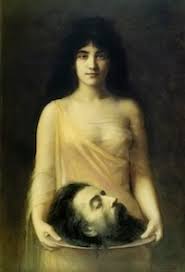 योचनान को उसकी कोठरी में जल्दी और ठंडे तरीके से धड़ से अलग कर दिया गया। युहन्ना के सिर को बालों से पकड़कर, जल्लाद उसे एक थाली में ले आया और लड़की को दे दिया, जो उसे अपनी माँ के पास ले गई (मत्ती १४:११; मरकुस ६:२८)। जब थाली को उस पर खून बह रहा सिर के साथ लाया गया था, इसमें कोई संदेह नहीं था कि सलोमी ने इसे अपने हाथों में लिया ताकि इसकी एक बूंद उसे दाग न दे, और वह अपनी मां के पास चली गई जैसे कि राजा की मेज से कोई पसंदीदा पकवान ले रही हो।
योचनान को उसकी कोठरी में जल्दी और ठंडे तरीके से धड़ से अलग कर दिया गया। युहन्ना के सिर को बालों से पकड़कर, जल्लाद उसे एक थाली में ले आया और लड़की को दे दिया, जो उसे अपनी माँ के पास ले गई (मत्ती १४:११; मरकुस ६:२८)। जब थाली को उस पर खून बह रहा सिर के साथ लाया गया था, इसमें कोई संदेह नहीं था कि सलोमी ने इसे अपने हाथों में लिया ताकि इसकी एक बूंद उसे दाग न दे, और वह अपनी मां के पास चली गई जैसे कि राजा की मेज से कोई पसंदीदा पकवान ले रही हो।